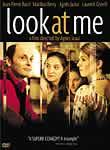 Look at Me (Agnès Jaoui, 2004)
Look at Me (Agnès Jaoui, 2004)This has been sitting by my TV for probably a couple of months, along with a bunch of other random indie movie screeners I brought home from work with the intention of watching eventually. But reviews, particularly Liz Penn's, spurred me to finally pop this in, and while I'm not sure it's a "juicebomb," as Penn (aka Dana Stevens) calls it, it is a nicely entertaining film that flirts with a number of cliches and doesn't give in to any of them. Ultimately, it's a another ensemble drama about self-absorbed rich people, but Jaoui has a good eye for what makes artistic people tick, and her co-writer Jean-Pierre Bacri gives a great performance as an arrogant writer who is a complete prick to everyone around him, yet still manages to remain somewhat likable.
 Romance (Catherine Breillat, 1999)
Romance (Catherine Breillat, 1999)I despair for whoever is unlucky enough to be having sex with Catherine Breillat. She has the coldest, most brutal view of sex I think I have ever seen in cinema, and this movie is one long attack on both sex and romantic love. I thought Fat Girl, the only other Breillat movie I've seen, was flawed but ultimately fascinating, because it explored genuine characters that I could feel for. This is just ugly and repulsive, and I'm not talking about the sexual explicitness. A quick glance at IMDb reveals that pretty much every one of Breillat's movies tackles the same subject (the bleakness of sexual relations), and I just don't think I have the tolerance to take any more of it.
 The Widow of St. Pierre (Patrice Leconte, 2000)
The Widow of St. Pierre (Patrice Leconte, 2000)I became totally taken with Leconte after seeing his last two movies, The Man on the Train and Intimate Strangers. I especially loved Intimate Strangers, which was one of my favorite films of last year. This is, in certain ways, very different from those films, in that it's a period piece based on a true story and has a clear political agenda, but it also deals with what is clearly Leconte's favorite theme: Two utterly different people coming together under bizarre circumstances and connecting in an intimate but non-sexual way. Beautifully shot and wonderfully acted, especially by Juliette Binoche, this is a great film with an impossibly heartbreaking ending, and it makes me disappointed that only one of Leconte's other movies (Ridicule) is currently available on NetFlix. It's in my queue, of course.
2 comments:
The thing that spooks me about Romance is that Breillat honestly believes that the sexual fantasies and desires she depicts are common to all women, and if women find the movie offensive, it's because they are unwilling to accept this within themselves.
And so, while I think you're right about her films being about the bleakness of sex, I don't think she thinks of them that way. She describes the sex and relationships in Romance as "beautiful." This just seems incredibly bizarre to me. It's like whenever I hear her talk or read her interviews, any redeeming quality I thought her films possessed goes out the window. (As when she talked about how the heroine of Fat Girl wants to be raped at the end, and it's a positive experience.)
Sometimes I think I really hate French film. That said, I want to ask you: I haven't seen anything by Leconte. Should I? Which one do you most recommend?
I definitely recommend Leconte; everything I've seen of his so far has been excellent. My personal favorite is Intimate Strangers, which starts like it might be a sort of Hitchcockian thriller but turns into a sweet and odd story of friendship. I don't know if that's the best place to start; some of his better known work, like The Hairdresser's Husband or Monsieur Hire, might be better entry points, but I haven't seen them since they don't appear to be available on DVD in the U.S.
Post a Comment